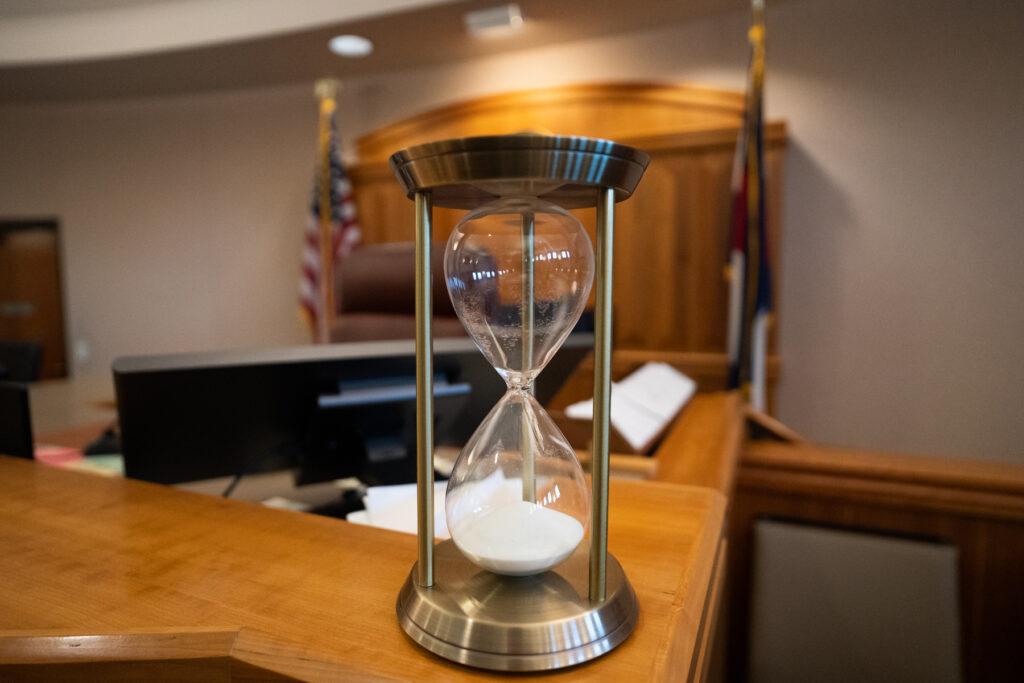
Colorado courts are rolling out a new program that leaders and advocates hope will make a dent – even if small – in the long wait times for competency evaluations.
The new program, competency diversion, offers judges an alternative to consider when they suspect someone who has been charged with a crime might need a competency evaluation.
The alternative is needed, advocates say, because the waitlist for people who need an evaluation, and who then wait for services if they’re found incompetent, is too long.
Sometimes people are sitting in jail while they wait longer than if they had been found guilty of a crime, advocates say.
And when they do get services, what the state provides is often not what people expect.
“It's really a civics lesson,” said Amanda Myers, one of the state’s senior court programs analysts. “Mental health support is given so they can learn that civics lesson and go back to the courtroom.”
State under decree over wait times
Colorado is under a court order called a consent decree because of the wait times for competency evaluations and services. The state pays about $13 million each year in fines for failing to correct the problems.
In the courts, a person has to be able to understand and participate in legal proceedings and decisions. A person cannot be tried or convicted if they are found incompetent. In many cases, the person is restored to competency with treatment or medication.
This month, some lawmakers are also scrutinizing the state’s competency system because of a different law passed last year that requires the state to drop charges for some people who are found incompetent and who cannot be restored to competency.

But advocates and families have multiple stories of people who they say have gotten more sick while waiting for competency evaluations or services in jail, without medication, and often thrown in isolation. Sometimes people have attempted suicide, and in some cases, people have died.
Even without last year’s law directing some charges to be dropped, an estimated 12 percent to 15 percent of people get their charges dismissed because they reach a cap on how long they’ve waited either for an evaluation or for services.
Then, thrown out into the community without services, they can end up in legal trouble again and sent back to jail to repeat the process.
More waiting after an evaluation
Lawyers say that once a person is found incompetent – which means that they cannot stand trial because they can not understand the court proceedings enough to participate – they wait for a bed to open up at the state’s mental health hospital in Pueblo.
Once there, they may get medication to stabilize a mental health crisis, but then the key to the required restoration services are civics lessons to understand what happens in a courtroom.
In a legislative hearing last year discussing the need for the new diversion program, James Karbach, director of legislative policy and external communications for the state office of the public defenders, said that, “public defenders experience odd conversations with clients who have gone through this civics workbook.”
He described one person who had gone through a restoration program in a Denver jail.
“It included watching the second half of My Cousin Vinny, the first half of The Fugitive, Legal Jeopardy, and a whole bunch of instruction about the law,” Karbach said. “I think It shocks the conscience to think it would solve problems in our competency system.”
New program focuses on services
The idea of the state’s new diversion program, which began rolling out in some judicial districts in April, with more joining in October, is that if the judge, prosecutor and defense attorney agree that a person is probably going to end up in the competency waitlists, and the crime they’re being charged with is minor, they can create a plan to help the person instead.
That means the person would get an evaluation – something more comprehensive than a competency evaluation – that actually looks at the person’s mental health needs. Then a plan could be devised to connect the person to housing, for example, to get medication, therapy, or a monitoring program to ensure they’re remembering to take medication.
Some of the people who may go through the program aren’t the kind that get the most attention in the media for violent crimes and complex mental health struggles.
It could be people who have dementia or Alzheimer's who need to be placed in assisted living. Or people with developmental or intellectual disabilities who haven’t been able to get resources and end up getting charged with crimes like trespassing or menacing, because in a moment of crisis, someone ends up fearing for their safety.

Susan Blanco, chief judge for the 8th Judicial District based in Fort Collins, has been a state leader in looking for alternatives for competency cases. Before the competency diversion program they’ve just started using, her district had a program called the competency dockets, which aimed to create personalized plans for people to get help.
“I don't think we were giving enough care and consideration for the ‘why is this person unable to stand trial?’ ” Blanco said. “Is there really a solution at that state hospital for this individual? Because, for example, if they have dementia, and there is no medication or anything that they're going to be offered in Pueblo at the state hospital, why are we sending this person all the way to Pueblo?”
With the new diversion program, if everyone agrees on a plan, the court would monitor that the person complies with their particular plan rules, and if the person is successful and does not get in trouble with the law again, their charges could then be dropped.
If they fail to comply with the plan, for example, not taking their medication or following through with whatever treatment they needed, the prosecutor could revoke the plan and continue prosecuting the original charges.
Dozens diverted since spring
Since April, when four judicial districts, some of the state’s largest, started rolling out the option of competency diversion, about 50 people have been referred to the diversion program. About 6 percent of them were found not eligible for a diversion program because they had needs that were too severe.
In 2024, Colorado completed about 5,500 competency evaluations and then, of those, got close to 3,000 orders for restoration for when people were found incompetent.
The 50 people who may have also ended up on the list and instead are in diversion programs is a small number but expected to grow.
One limitation that leaders are looking out for is that as more districts roll out the program, the people who may be able to participate could vary a lot depending on the local services that exist in a community.
Blanco said housing and transportation are already being identified as high needs in her community, but she said she knows that other smaller districts might have even more challenges to connect people with the services they need.
For this program, because it was created by a legislative bill last year, state leaders will have to produce a report each November that helps lawmakers and the public track how it’s going.
“I think this program is one part of a bigger system,” said Jack Johnson, public policy director for Disability Law Colorado, one of the advocacy groups that first sued the state, but has since been working with lawmakers on fixes to the competency issues. “If we don't fix other parts of the system, this program will only take small chunks of this big meal we have.”
A closer look at the numbers
In 2024, the Colorado Department of Human Services says:
- Colorado completed 5,500 competency evaluations
- Someone who has multiple charges in a single case might have multiple orders for competency evaluations
- About 54 percent of evaluations resulted in an incompetence finding
- 1,400 unique individuals appeared on the waitlist
- The larger portion of people are referred to restoration services while they are outpatients, not in jail
Regarding the waitlist for services:
- In 2011, when the lawsuit was filed, there were less than 100 people on the waitlist
- From 2017 to 2024, there was a 95 percent surge in restoration orders
- The list peaked at a high of 480 people in May 2023
- Currently, the waitlist has about 320 people
In the 8th Judicial District, prior to the diversion program, the competency court docket program was starting to make a difference, leaders say:
- The Competency Court Docket began in 2021
- Starting in 2021, there were 57 percent of participants in custody and 43 percent of participants in the community.
- Starting in 2024, there were 44 percent of participants in custody and 56 percent of participants in the community.








